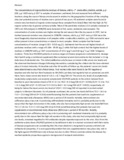| dc.description.abstract | Thirty-four HIV/AIDS patients at various stages of disease progression volunteered to manage their health using a nutritional supplement that contained several micronutrients that included a 15 nig daily dose of elemental zinc. This initial publication only focuses on trends in the serum zinc levels and the observed biochemical changes following intervention, considering the critical role this trace element plays in human immunity. At baseline and after 30 months of follow-up, the patients' serum zinc levels were determined as was their clinical status. Four women who were found to be HIV negative at baseline and who had lost their husbands to HIV/AIDS, yet they had regularly had un-protected sex with them, had a mean serum zinc level of 116.2 ± 32.7 meg/100 ml. The serum zinc levels of asymptomatic, moderately symptomatic and severely symptomatic HIV/AIDS patients in the cohort reduced from baseline to post intervention levels of 92.5+12.1 to 78.0 + 8.2 meg/100 ml (P = 0.056); 81.9+ 17.6 to 73.2 + 12.2 meg/100 ml (P = 0.267) and 72.7+ 8.0 to 66.8 + 14.3 meg/100 ml (P = 0.022), respectively, all being far below the mean serum zinc level of 120.0 + 22.0 meg/100 ml reported in normal control subjects in Western literature. For all patients combined, the serum zinc levels fell from 79.2 + 14.5 to 71.0 + 13.0 meg/100 ml (P= 0.016) notwithstanding that the patients had used zinc supplements at recommended daily allowances (RDA) over a period of 30 months. Notably, micronutrient zinc sufficiency plays a key role in promoting cell-mediated immunity and it is probably partly due to this reason that the high-risk women in this study, who also had comparably high serum zinc levels fell from 79.2 +/-14.5 to 71.0 +/-13.0 mcg/100 ml (p=0.016) notwithstanding that patients had used zinc supplements at recommended daily allowances (RDA) over a period of 30 months. Notably, micronutrient zinc sufficiency plays a key role in promoting cell -mediated immunity and it is probably partly due to this reason that the high risk women in this study, who also had comparably high serum zinc levels, remained negative for HIV antibodies despite repeated exposure to the virus. thus from this preliminary data shows HIV/AIDS patients to be deficient in zinc in a manner consistent with their status of disease progression and considering that this trace element is recognized to possess antiviral and antibacterial properties, it is now apparently evident that zinc supplementation may play a key role in the fight against HIV/AIDS not only in Kenya but also in other African countries where the disease has reached epidemic proportions against a background of rampant malnutrition | en |

